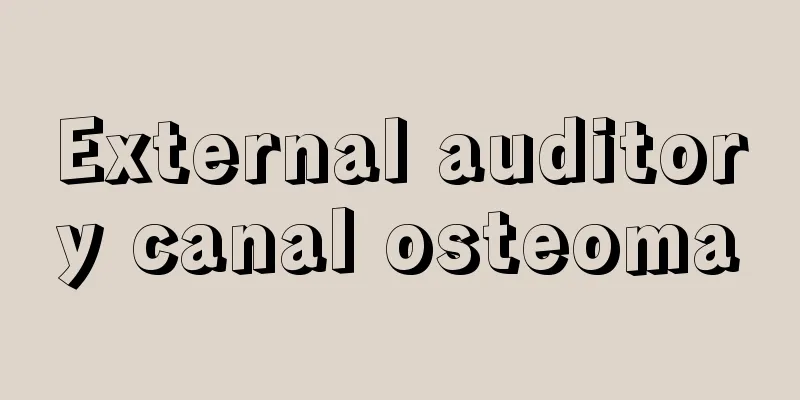External auditory canal osteoma

|
Osteoma is a very serious disease. It can occur in any part of the body. The ear is a relatively fragile place and is prone to bone tumors. Osteomas on the ear are divided into external auditory canal osteomas and internal auditory canal osteomas. However, external auditory canal osteomas are more serious. They are caused by local nodules in the ear bones. If you suffer from external auditory canal osteomas, your hearing will be greatly affected. You will often feel a buzzing sound in your ears and cannot hear clearly. The following is a detailed introduction to external auditory canal osteoma. Osteomas of the ear may occur in the external auditory canal, tympanic cavity, mastoid process, or squamous part of the temporal bone. External auditory canal exosteoma is a nodular protrusion formed by localized excessive proliferation of bone in the bony wall of the external auditory canal. It is a benign tumor and includes multiple dense bone tumors (exosteomas) and single cancellous osteoma, the latter of which is extremely rare. External auditory canal exosteoma is one of the most common benign tumors in the external auditory canal and is more common in young and middle-aged men. It is often bilateral and often multiple. Small osteomas may not cause any symptoms and are often discovered accidentally during an ear examination. When the volume increases, the external auditory canal may become narrower, causing hearing loss, or due to the combination of cerumen lumps, cholesteatoma formation, etc., the external auditory canal may be blocked, causing a feeling of occlusion or even infection, resulting in pain, pus discharge, etc. The diagnosis is not difficult based on the medical history and local findings. If a nodular or semicircular protrusion is found deep in the external auditory canal that is hard to the touch, exosteoma should be considered first. CT examination can determine the location and size of the bone tumor, as well as whether the tympanic cavity and mastoid are affected. Otoscopic examination revealed a round, smooth, hard nodule in the bony part of the external auditory canal with a broad base and covered by normal epithelium. X-rays of the skull base or temporal bone CT scans show bony external auditory canal stenosis, with a semicircular shadow that is completely consistent with or similar to the bone density. Small, asymptomatic bone tumors do not require treatment. If the tumor enlargement causes hearing loss, pain, or infection of the outer ear or middle ear, surgical resection and reconstruction of the external auditory canal can be performed. The surgery can be done through an incision in the ear, separating and lifting the skin and periosteum on the surface of the osteoma, carefully grinding them off with a high-frequency electric drill or chiseling them off with a bone chisel. If necessary, part of the external auditory canal bone wall can be ground off to reduce recurrence and avoid stenosis of the external auditory canal. |
<<: Grape seed taking method and dosage
>>: Is it serious to have a bone tumor on the head
Recommend
Is advanced liver cancer contagious? Not contagious
Late-stage liver cancer is not contagious. Many p...
Postoperative care after laryngeal cancer resection
What are the postoperative care for laryngeal can...
Is it okay to not have surgery for brain cancer?
Brain cancer is a malignant tumor that occurs in ...
Muscle relaxation method relieves mental stress from brain cancer
Headache is one of the main manifestations of bra...
Can hawthorn be used to make wine?
Liquor is a type of alcoholic beverage and appear...
What to do if you have swollen tonsils and cough
Tonsils are lymph glands deep in our mouths. Infl...
Are big blueberries better or small ones?
Blueberries have high nutritional value and taste...
Longevity tonic wine, please remember the precautions
Recently, a medicine called Yishou Dabujiu has ap...
How to effectively exercise thigh muscle atrophy
Thigh muscle atrophy is often caused by some trau...
The early symptoms of cardia cancer are mild and occur intermittently
Early symptoms of cardia cancer are often caused ...
What is the white color on kimchi
Many people don’t know much about the white subst...
What are the five specialties for narcotic drugs
Anesthetic drugs are also commonly used in clinic...
How to reduce inflammation when inserting a urinary catheter
A urinary catheter is a commonly used auxiliary d...
How harmful is glioma to humans?
Glioma is a common intracranial malignant tumor i...
Is the fat-shaking machine harmful to internal organs? You should pay attention to these 6 hazards
You can see various fat-shaking machines on TV or...









